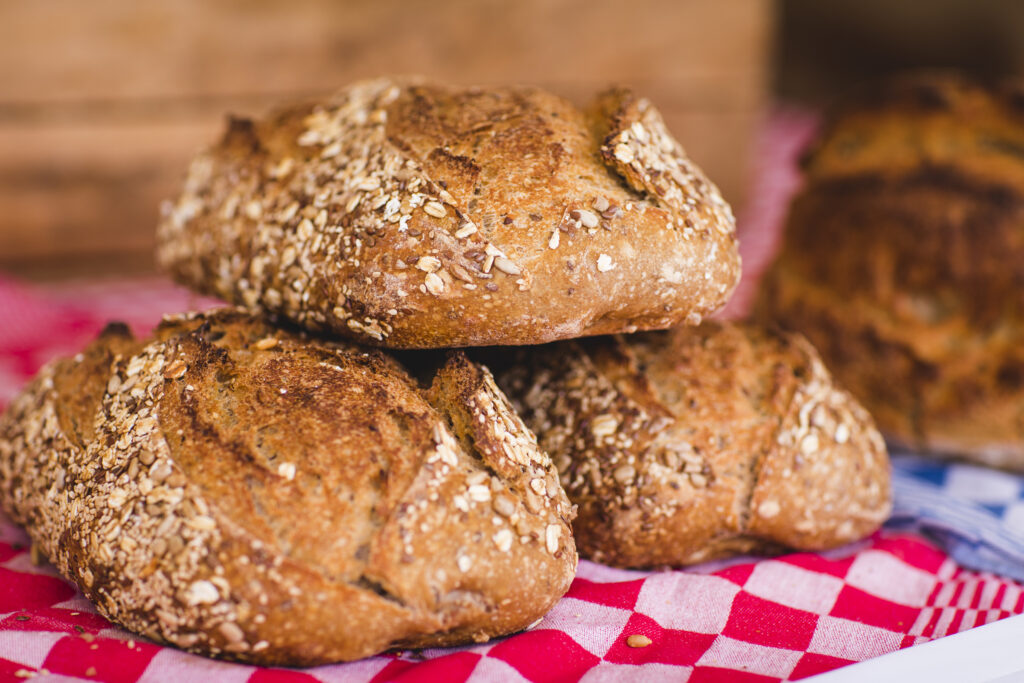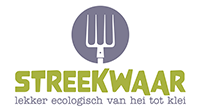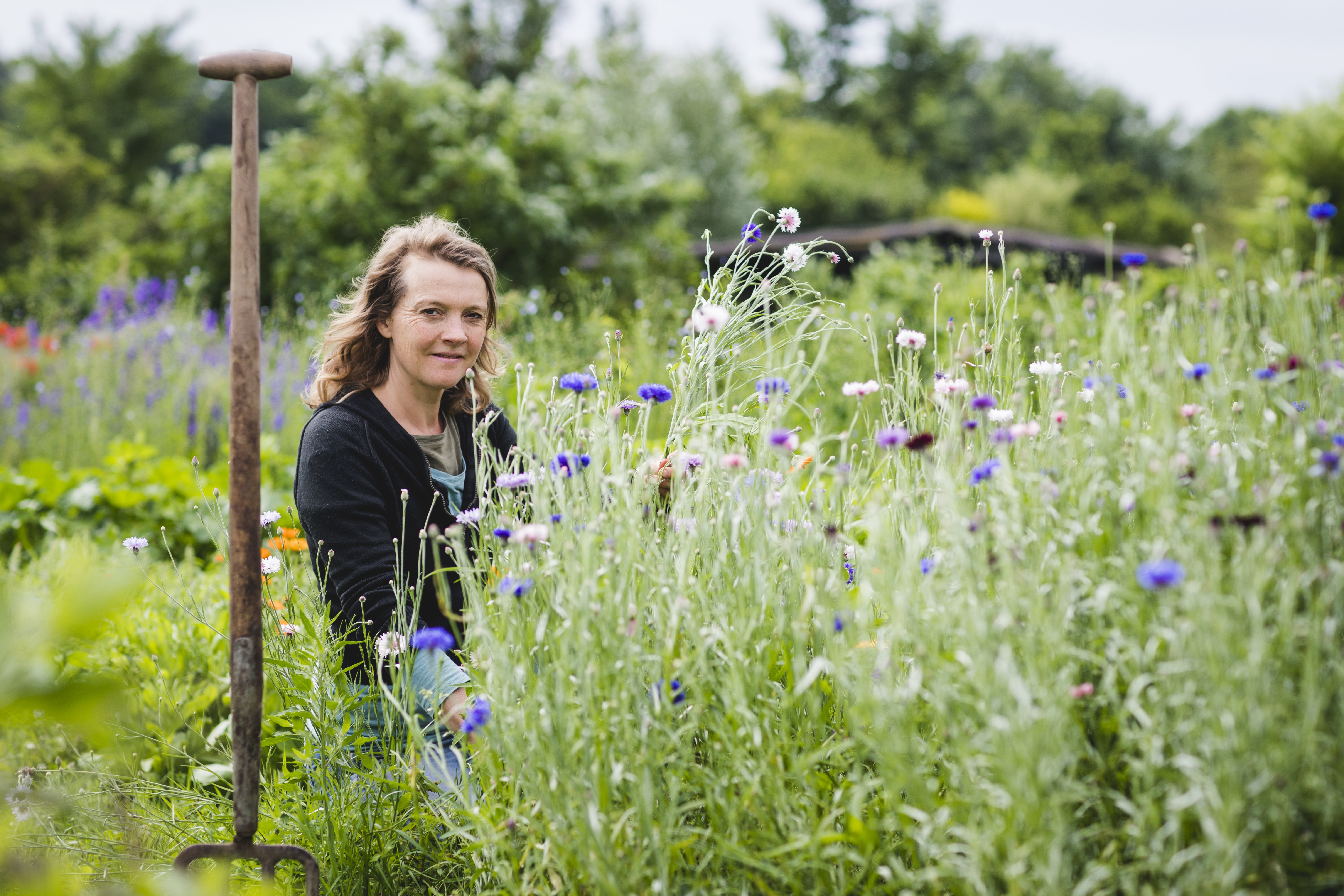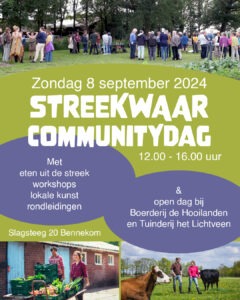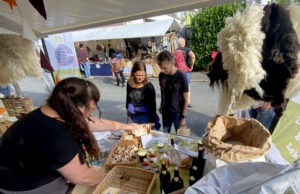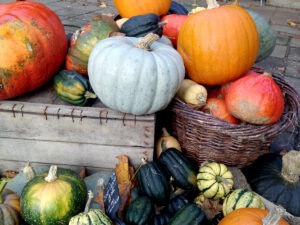If we are to transform food systems through agroecology, we must switch from industrial food chains to regional food networks in which farmers and citizens reclaim power. That much we already know. But how can this be done? What do new relations between producers and citizens look like? How can everybody feel and take responsibility? In the region of Ede-Wageningen, the Netherlands, a great example to help us explore these questions has emerged: the StreekWaar local food network. BY JANNEKE BRUIL and CHRIS CHANCELLOR
Wageningen is a small Dutch city of around 40.000 residents that is mostly known abroad for its life sciences university, which may explain why so many residents are aware of and active on issues related to food and sustainability – both Dutch and international.
The market as a place for connection
If you are ever in the centre of Wageningen on a Saturday, go and take a look at the central market. In a side street you will spot the waving flags of StreekWaar, the local association of agroecological farmers and other sustainable food producers such as cheese and kombucha makers. The Streekwaar stalls are a place where producers and residents meet. People come here to get, and taste, their local agroecological groceries. They chat with the producers that are present, learn more about how their food is grown or made, and exchange ideas about the preparation of relatively unknown vegetables such as Shungiku, an edible Chrysanthemum, originally from Asia, that now also grows on the outskirts of the city.
And it is not only in the queue of customers that you can find local residents; they can also be seen behind the stalls wearing StreekWaar aprons. From university researchers, to local mothers and international students, these are people that enjoy this way of connecting with producers and of strengthening their local food system. Started during the pandemic in November 2020, the Streekwaar market has become a place for connection, community and communication around agroecological food.
All the products on the stalls come from producers who are located within a radius of 15 km from Wageningen. They are not only farmers and market gardeners, but also food processors and artisans such as the mill, cheesemakers, bakers, brewers, as well as shops and caterers. All are pioneers in their own area of expertise.
Over the years they realised that they needed each other to create and strengthen an alternative, regional economy. In 2021 this was formalised through the StreekWaar Association. Currently there are over 35 members.
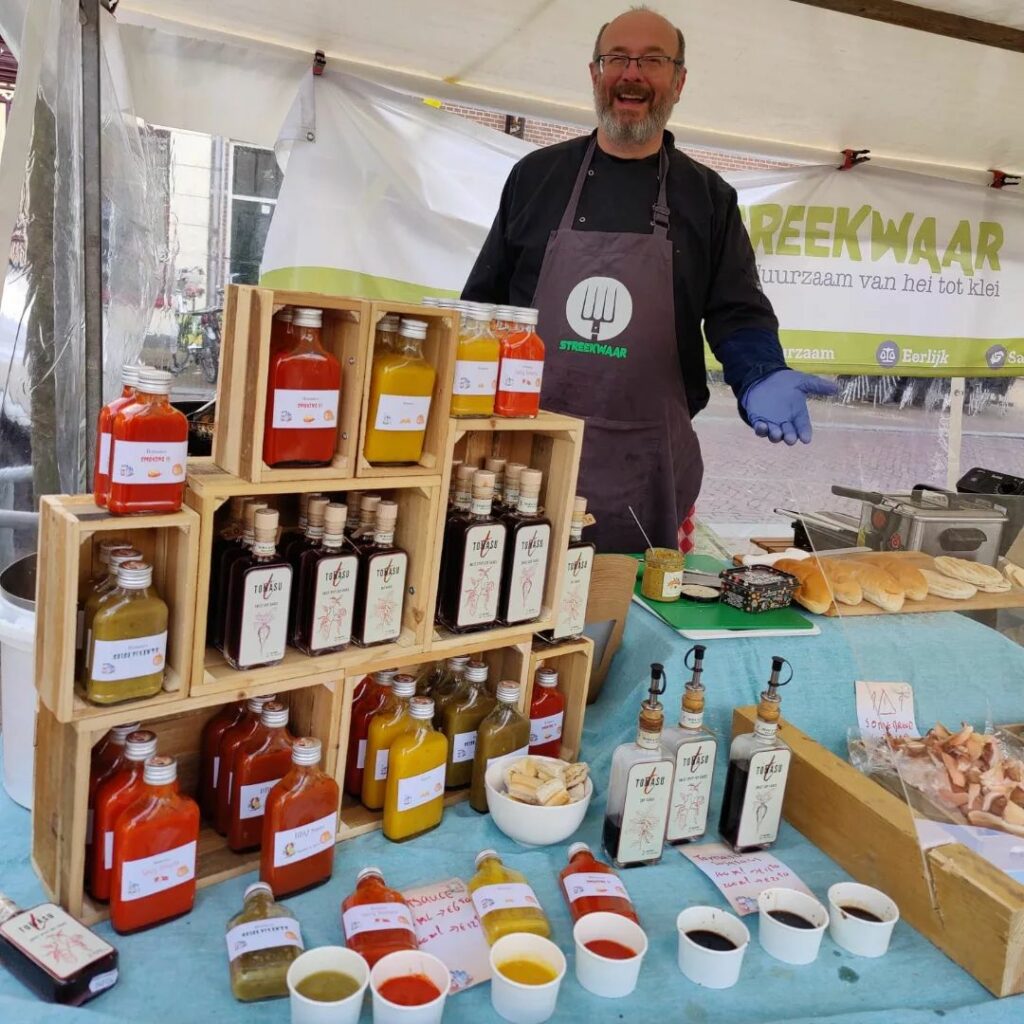
The route to self-governance
Of course, all sorts of collaborations between producers in the area already existed. The Grebbeveld sheep grazed the historical grain fields of GraanGeluk, the spent grains from the prize-winning beer brewers of the Stadsbrouwerij went to the cows of local dairy farm De Hooilanden, the asparagus from the Oude Ronde could be found in the dishes of Paula’s Catering. Yet not everybody knew each other and people expressed a need for more exchange of ideas and joint initiatives.
Members exchanged questions, dilemmas and solutions, through which they gained a firmer understanding of each other’s methods and choices.
Sensing the potential of this nascent local food network, they set up a loose platform in 2018, in part facilitated by the municipality of Wageningen. This led to a number of joint activities, such as joint participation at special fairs and excursions for visitors to the city. Above all, however, the platform served as a networking space. The members exchanged questions, dilemmas and solutions, through which they gained a firmer understanding of each other’s methods and choices.
These discussions not only brought existing producers closer together, but even stimulated and inspired new entrepreneurs. The Gieterij, a green, package-free grocery store, was founded partly as a response to the lack of a central sales point in the city for local products. Agroecological market garden Het Lichtveen was made possible through the platform, as explains farmer Pauline Martel: “During our search for land, other producers directed us to De Hooilanden, where we now rent our plot.”
The use of the platform was therefore evident. At a certain moment in 2020, the question emerged: do we go forward as an informal platform, or do we want to set up our own independent, self-governed organisation not directly connected to the municipality? On a sunny day at one of the farms, producers decided to set up their own organisation. This was not principally directed towards sales (as in the case of a cooperative), but much more towards sharing knowledge and enhancing sustainability, visibility and the connection with citizens in the region.
In March 2021, the StreekWaar Association became a fact, with statutes, admission criteria, a board and committees. The most significant step resulting from this came in the field of governance: the producers themselves make the decisions about the activities and direction of the association. It is now also easier for them to take a collective position vis-à-vis the municipality or the province, for example. StreekWaar currently has over 35 members in the region, including nationally renowned frontrunners such as self harvest CSA De Nieuwe Ronde, biodynamic farm Veld en Beek and restaurant Smaakpark.
The association is working towards its own version of a Participation Guarantee System.
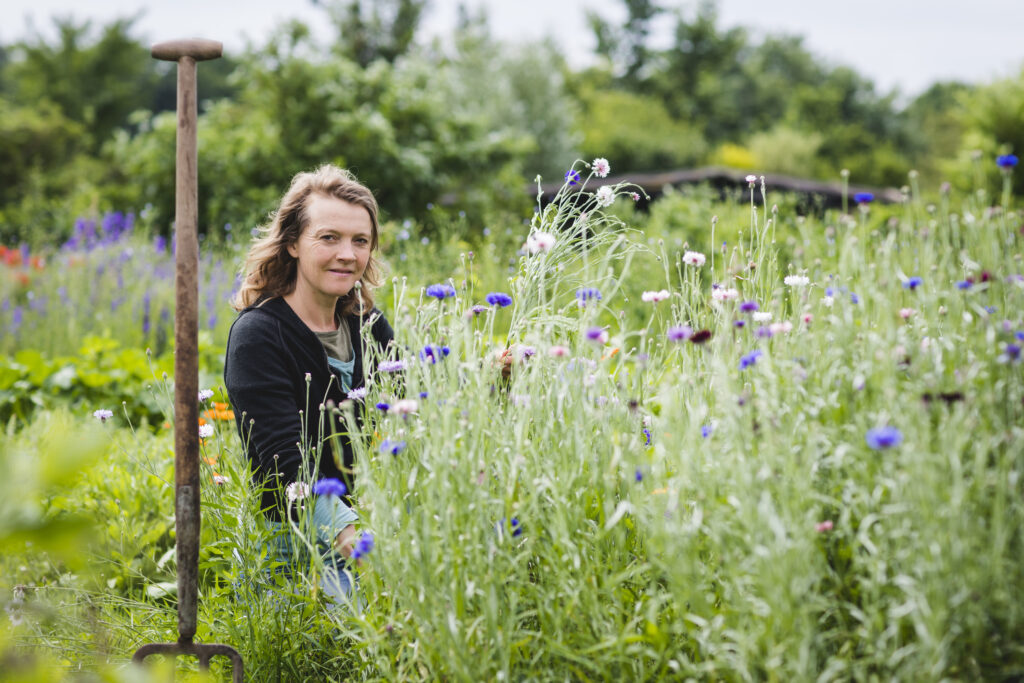
“Real sustainability”
The collectively agreed admission criteria are a fundamental part of StreekWaar and at the same time make the association unique.
Not all the members of the association have organic certification. For some of them this is too expensive, for others the conditions of the Dutch organic certification body (SKAL) are an obstacle to their own path towards sustainability, for example to sourcing ingredients regionally. For these reasons the members have identified their own values for sustainable production. “The consumer is too often deceived by the word ‘sustainable’. Our association wants to achieve real sustainability, and not just be partly-sustainable. We are clear and transparent about that,” says Jan Wieringa of Veld en Beek farm.
The association has expressed its wish to contribute to:
- Reducing CO2 emissions and energy use in food production
- Living soil and greater biodiversity
- Less soy and other animal feed imports
- Animal welfare
- Connecting citizens (consumers) with fair, local food and the people producing it
- Better accessibility, visibility and feasibility of sustainable, local products
- Transparency about production methods and pricing
- Less waste and packaging
In order to achieve this, the StreekWaar Association has set out a number of principles. Members have agreed that everyone must meet these requirements in order to join the association. These principles are also clear and verifiable for residents, because they can see and assess them by themselves at the production locations. Check out the sustainability principles here
When applying for membership, prospective members must demonstrate how she or he works with these principles, or explain why they may be unable to. An admissions committee, consisting of five StreekWaar members, discusses each application and makes the decision about admission. This is not always easy, says one member of the committee: “We’ve had a few tricky situations, but we’ve always worked it out. The reasoning of the producer and their vision for the future are also important to us in this regard. We are all on a path and encounter many bumps and choices. We are also there to help each other on this journey.”
The association is working towards its own version of a Participation Guarantee System (PGS) in which members share and monitor each other’s progress. This is still very much a work in progress. Many PGS around the world also involve cooperation with citizens, so that they also take responsibility for the local food system. The next step for StreekWaar is therefore to see whether and how residents can play a greater role in this further quest for sustainability.
PGS = Participatory Guarantee System, an internationally used concept in which farmers determine their own quality values (sometimes together with citizens), instead of having to comply with the requirements of an external certification body.
The role of citizens
It is clear that residents find the story of StreekWaar important and would like to do more than just buy the products. Fortunately, it is increasingly possible to give a concrete form to producer-citizen cooperation.
Running the market stalls is an example of this collaboration. Sometimes the innovation comes from the residents themselves. The live cooking stall, for instance, took shape following the ideas and efforts of a couple of volunteers that felt people should be able to taste some of the seasonal products on the stall in the form of a freshly cooked meal.
With citizen-led initiatives, the right form and balance remains to be found to ensure governance of the network is still centred around the producers
Residents are also committed to StreekWaar in other ways. For example, some were actively involved in running a pilot collection point for online orders. A group of producers are now exploring whether and how the webshop structure can be used as an ordering platform for restaurants and other companies. There are also people who volunteer to help organize excursions. This has proven to be a great way to engage even more people with local, sustainably sourced food.
With these citizen-led initiatives, the right form and balance remains to be found to ensure governance of the network is still centred around the producers. On the one hand, some residents are eager and have time to do something, and on the other, it is important that producers remain in control of the development of their association. In addition, both residents and members of StreekWaar are also very diverse in terms of wishes, capacities and available time, which can complicate decision making. All this is a continuing process of exploring a path forward together.
System change – and its challenges
StreekWaar shows what a new system can look like: from competition to cooperation, from global chains to regional networks, from anonymity to relationships, from specialisation to diversification. From being stuck between the bank and the supermarket, to gaining control over your business and livelihood. Knowledge, resources, products and revenues circulate and remain in the area. In this sense short food chains are no longer simply a revenue stream for farmers, but in fact become the basis of an alternative economy.
Does it sound easy? Not a chance. Bringing pioneers together in such a way that they are compelled to devote their energy to the common cause, feel a sense of ownership and are able to derive benefits form this, represents both the success and the challenge of StreekWaar. This requires constant attention.
StreekWaar shows what a new food system can look like: from competition to cooperation, from global chains to regional networks, from anonymity to relationships, from specialisation to diversification
New challenges keep cropping up: for example, in the complex logistics of the joint market and the webshop. Or when doing effective PR. Or in nurturing and strengthening the involvement of citizens. Making decisions is sometimes difficult. In a group as diverse as StreekWaar, where producers are primarily engaged with their own businesses, it is not easy to collectively bear responsibility for these matters. Who owns these kinds of problems? Who takes the initiative? And who has the time and inclination to discuss these things and develop solutions?
Then there is also the question of what the decision-making processes between farmers and citizens will look like. But no one said it would be easy. It is completely in line with today’s world, in which farmers are making more direct connections with society and in which citizens actively participate in shaping a different food system. In our experience, this is the work we have to do if we want to achieve systemic change towards agroecological food systems: trying new ways of organizing, building new relationships, telling new stories and building a new economy.
